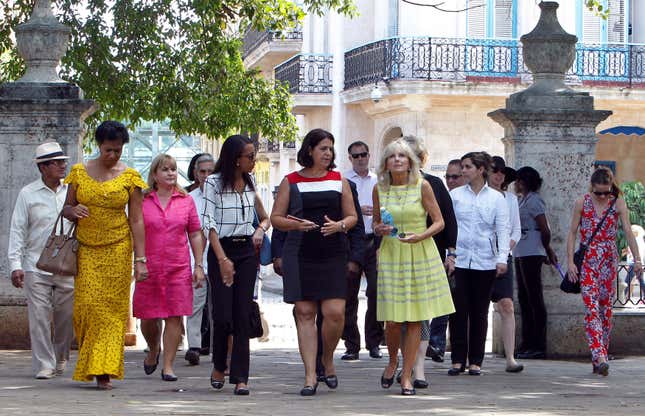
China is planning to pay the Cuban government several billion dollars in exchange for its support of a signals intelligence facility on the island nation that will be able to eavesdrop on military and other communications in the southern US, according to the Wall Street Journal.
A Defense Department spokesperson characterized the report as “not accurate,” while John Kirby, a White House National Security Council spokesperson quoted in the Wall Street Journal story, declined to comment on the report but did not dispute it.
The news, reminiscent of the Soviet Union’s use of Cuba as a spy center and, briefly, nuclear missile staging point, highlights the failures of successive US presidents to win over the island and reduce its economic dependence on authoritarian nations that undermine US foreign policy.
It’s fair to point out that the US has many military and intelligence facilities in countries that neighbor China, and regularly flies intelligence gathering missions near its national airspace. But from a US perspective, the way to prevent a far-away rival from teaming up with an unhappy neighbor is to mend fences with that neighbor.
Obama’s first steps toward normal relations with Cuba
During the Obama administration, the fractured relationship between the Cold War antagonists looked ready for a full thaw. Cuba’s economy, largely dependent on Russian and Venezuelan aid, was a disaster, cramped by poor central planning as well as US sanctions and a trade embargo, which denied Cuba access to American markets and investment. Many of the country’s best-educated citizens had fled.
In 2009, then-president Barack Obama began easing US restrictions on travel and remittances to Cuba. In 2014, he announced the beginning of a process that allowed limited trade between the two countries to begin again.
That was a boon for Cuba, and for American visitors. Critics argued that any spending there benefitted the country’s repressive socialist government, and no doubt some of it did, but it also drove real estate investment and goosed a growing private sector whose existence put pressure on the Castro regime to pursue reforms.
Congress didn’t move to lift the embargo, but there was a possibility of real rapprochement. Major US companies like Google and Caterpillar were eager to open trade, and Cubans—while unwilling to abandon their cherished national identity—were ready to pursue a pragmatic policy to increase prosperity.
Under Trump, Washington reversed course
Donald Trump’s election to the White House in 2016 changed all that. Indebted to hardline Cuban American voters in Florida who saw any concession to Havana as a weakness, Trump’s administration quickly rolled back Obama’s limited opening.
The decisions were played as an attack on the Castro regime, but the real losers were entrepreneurs in Cuba who were desperate to do business with America. At the time, observers predicted that cutting ties with Havana would simply create a opening for US rivals.
“If we pull out and return to a policy of isolation, then we leave the field open, not just for the Russians but for the Chinese, who are also really interested in building influence in Cuba,” William Leogrande, an American University expert on Latin America, told Quartz in 2017.
This created an opportunity for China
Sure enough, that’s just what happened. The covid-19 pandemic was brutal in Cuba; though the country’s public health institutions are highly lauded and it was able to develop effective domestic vaccines, the embargo and a lack of foreign exchange made it difficult to import oxygen, protective equipment, and other critical health supplies. The economy was already under strain, and the constant outflow of migrants only increased.
The US didn’t do much to help Cuba during the pandemic, or after it. The election of US president Joe Biden in 2020 could have been a chance to change course. Biden had promised to return to Obama’s approach, but he faced pressure within his own party, notably from Cuban-American senator Bob Menendez, the chair of the Foreign Relations committee and a strident opponent of the Cuban regime.
Biden did reopen limited travel opportunities and ease restrictions on remittances sent back by Cuban Americans in 2022, two years after taking office. But he also kept Cuba on the official list of state sponsors of terrorism, alongside Syria, Iran and North Korea, an addition made by Trump in 2021.
There’s no doubt Cuba’s government has violated human rights, but we’re living in a world where Saudi Arabia boasts a portfolio of more than $30 billion of US public equities, co-owns the PGA Tour, and hires American rockets to send its astronauts to space.
And, now, with Cuba lacking an economic partner and in need of cash, we live in a world where a far larger threat to the US will be listening in much more closely than Washington wants.